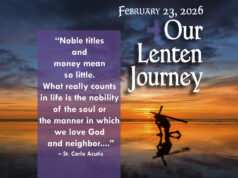Q: At my parish, we pray “for vocations to the priesthood and religious life.” But at the other parish in town, they pray for “vocations to the priesthood, the diaconate, marriage, and religious life.” How many vocations are there actually?
A: This is a tricky question to answer, because in our Catholic tradition the word “vocation” can mean different things in different contexts.
The word “vocation” comes from the Latin word “vocare,” or “to call.” A vocation is literally “a calling,” which in a Catholic sense typically means a calling from God.
The first and most foundational vocation for any Christian is our baptismal vocation, which the Catechism of the Catholic Church describes as “a vocation to holiness and to the mission of evangelizing the world” (CCC, No. 1533).
However, often the term “vocation” is used to describe a Catholic’s state in life, or a permanent life commitment that involves a certain role within the church. But even here, there are a few different ways to categorize the various states in life.
One way is to divide Catholics between ordained clergy — that is, bishops, priests and deacons — and non-ordained laity (See Canon 207 of the Code of Canon Law). By this standard, anyone who has not received the sacrament of holy orders would be considered “lay.”
We can also categorize states in life according to a three-fold division of: the ordained clergy, those in consecrated life and the laity who are neither ordained nor living in a public state of consecrated life.
In this latter, more robust sense of the word “laity,” the Vatican II document “Lumen Gentium” describes the lay faithful as having a distinct vocational mission of their own: “They are called there [i.e., in the ordinary circumstances of secular life] by God that by exercising their proper function and led by the spirit of the Gospel they may work for the sanctification of the world from within as a leaven.”
Lay people may also be called to marriage and family life, which naturally comes with its own joys, responsibilities and potential for bearing a Christian witness to the world.
“Consecrated life” is an umbrella category that encompasses a variety of specific forms, from religious brothers and sisters engaged in active apostolates like teaching or serving the poor, to monks and nuns dedicated entirely to prayer, to lesser-known forms like secular institutes, consecrated virgins and hermits.
However, members of the faithful in all forms of consecrated life have the special vocation of imitating Christ’s own way of life more radically and be “witnesses to the fact of a new and eternal life acquired by the redemption of Christ,” and foretell “the future resurrection and the glory of the heavenly kingdom.”
Yet even when speaking specifically about “state in life” vocations, it’s difficult to give an exact number for this since there are some instances when the various states of life can overlap. For example, some clergy, such as permanent deacons or priests from Eastern Catholic Churches, might also be married. (Though while an already-married man might receive holy orders in some circumstances, it’s worth noting that once ordained, clergy cannot marry or re-marry if their spouse dies.) Priests can also be members of institutes of consecrated life, giving them a dual vocation to the priesthood and consecrated life in their community.
But it’s important to keep in mind that the concept of “vocation” is ultimately not about sorting ourselves or others into boxes, but rather is about discerning and embracing God’s will for us in our own unique life situation — whether or not that fits tidily into one of the above-mentioned categories.
In fact, many of our greatest saints “broke the mold” in their vocation stories. Some of them responded to a call to pioneer new forms of Christian life, while others obeyed God’s call to a radical Christian life amid difficult, unusual or novel circumstances.
Jenna Marie Cooper, who holds a licentiate in canon law, is a consecrated virgin and a canonist whose column appears weekly at OSV News. Send your questions to CatholicQA@osv.com.












